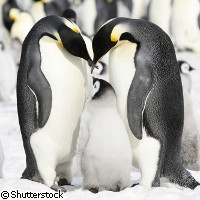New report highlights impacts of climate change on Antarctica
Rising greenhouse gas levels and the shrinking ozone hole mean temperatures in Antarctica could rise by 3°C over the next hundred years, contributing significantly to sea level rise, according to a new report issued by a panel of leading Antarctic scientists. The Scientific Committee on Antarctic Research (SCAR) has produced the first ever comprehensive review of the state of Antarctica's climate and its links to the rest of the global climate system. The report draws on the work of 100 world-class scientists from 13 countries. As well as setting out the latest research findings from the Antarctic, it highlights priorities for future research and answers pressing questions posed by policymakers on the melting of the Antarctic's vast icecap, sea level rise and biodiversity. 'Antarctica is an unrivalled source of information about our planet. This review describes what we know now and illustrates how human activity is driving rapid climate change,' explained SCAR executive director Dr Colin Summerhayes of the Scott Polar Research Institute in the UK. 'By integrating this multidisciplinary evidence into a single source, we will help scientists and policymakers understand the distinction between environmental changes linked to the Earth's natural cycles, and those that are human induced,' said Dr Summerhayes. 'The work is particularly important because it puts Antarctic climate change into context and reveals the impact on the rest of the planet.' One of the main findings in recent years concerns the interaction between the Antarctic ozone hole and climate change. Studies have revealed that the ozone hole has actually prevented climate change from having a greater impact on the icy region. International treaties have proved successful at reducing levels of ozone-depleting chemicals in the atmosphere, and the size of the ozone hole is now stable. As the ozone hole heals over the coming decades, it will no longer be able to shield Antarctica from the impacts of climate change. At the same time, carbon dioxide levels are rising faster than at any other time in the past 800,000 years. As a result, temperatures in the Antarctic are predicted to rise by 3%deg;C over the coming century. Despite this change, temperatures will remain well below freezing over most of Antarctica. Nevertheless, the loss of ice from the West Antarctic Ice Sheet is expected to contribute 'some tens of centimetres' to a predicted sea level rise of up to 1.4 metres by 2100. On the biodiversity front, the changing Antarctic climate has seen rain fall on the western Antarctic Peninsula during the summer, resulting in the rapid growth of plant, animal and microbe populations. In the seas around the continent, the loss of sea ice in some areas has led to changes in algal growth and a fall in stocks of krill, tiny shrimp-like creatures that are a food source for many creatures. Looking to the future, the scientists underline the need for more data on the climate in the remote polar regions, as well as a better understanding of how the climate has changed in the past. 'For me the most astonishing evidence is the way that one man-made environmental impact - the ozone hole - has shielded most of Antarctica from another - global warming. Understanding the complexities surrounding these issues is a challenge for scientists - and communicating these in a meaningful way to society and to policymakers is essential,' concludes the lead author of the report, Professor John Turner of the British Antarctic Survey. 'There is no doubt that our world is changing and human activity is accelerating global change,' he said. 'This review is a major step forward in making sure that the latest and best evidence is available in one place. It sets the scene for future Antarctic research and provides the knowledge that we all need to help us live with environmental change.'
Countries
Antarctica



